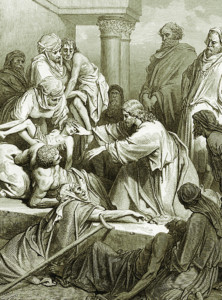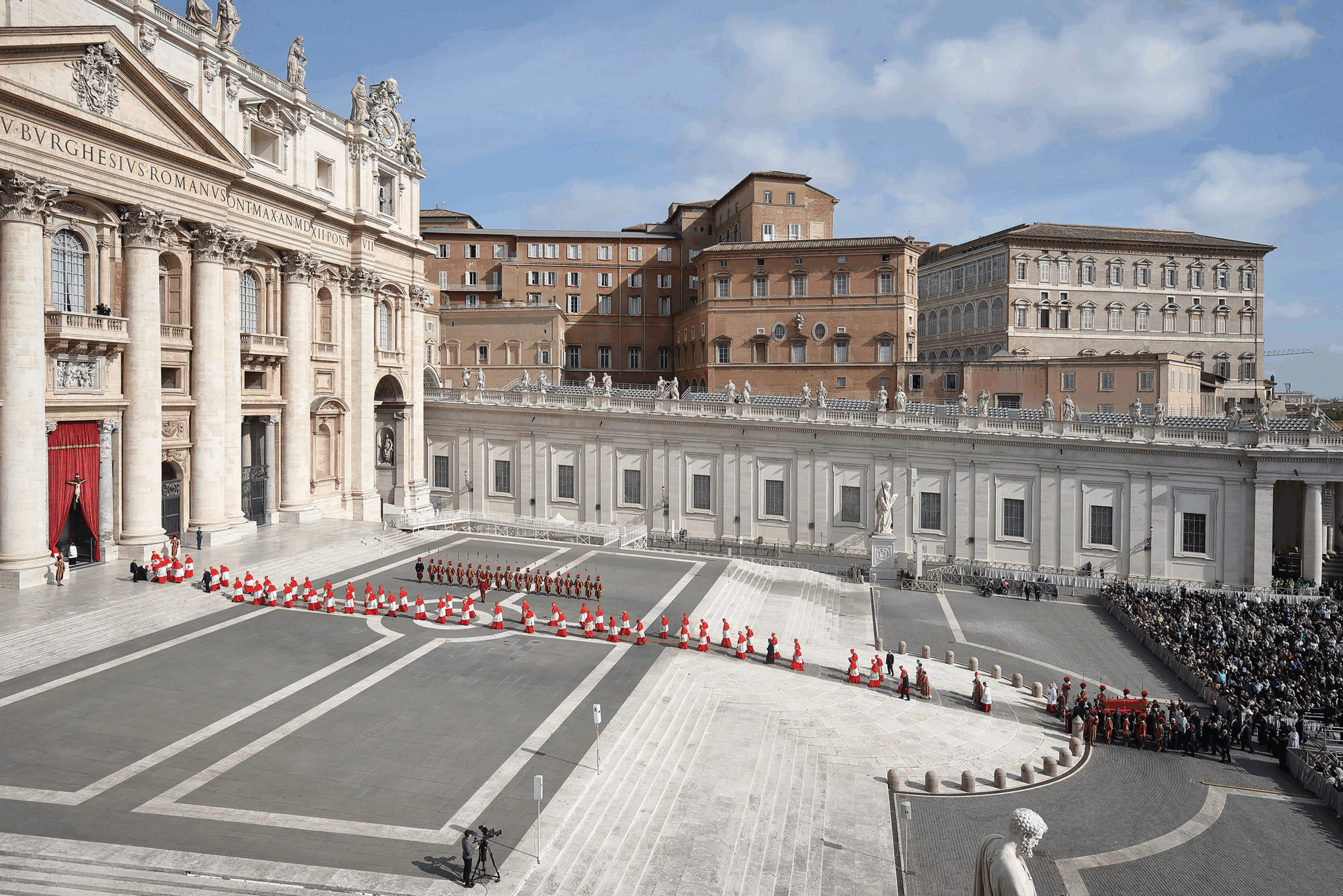The Sacraments in a Time of Crisis: a Canon Lawyer Critiques Current Prohibitions
By Philip C.L. Gray, JCL

Christ Heals the Sick, a woodcut from a Bible illustrated by Gustave Dorè
Faith is a free gift from God (Eph. 2:8; Catechism, Art. 153). But like any gift, if we do not use the Faith we are given, it simply collects dust on a shelf in our soul. If we use it, then we seek the Truth and respond to that Truth with generous acts of Love. So, here’s the first principle I think is important to understand: People of Faith will understand spiritual matters; people who have the gift but leave it unused will not. That’s a harsh reality, but Jesus Himself pointed this out to Peter and the apostles (our first bishops) several times (“Get behind me, Satan”). Let us strive to be people who see through the eyes of Faith what God wants for us.
He Wants Our Spiritual Health
Although God’s original plan was for human beings to be healthy and our bodies functioning according to His design, it is clear from Sacred Scripture that fear, bodily illness, and death arose from sin.
In James 5:14-16, we find the scriptural reference for anointing of the sick.
It is clear in this passage that sickness is connected to sin, and the first remedy for sickness is to heal the soul; the second remedy is for the body. It is only after prayers have been prayed and the soul attended to, that you call the physician.
This is also explained in Sirach 38:9-12:
My son, when you are sick do not be negligent, but pray to the Lord, and he will heal you. Give up your faults and direct your hands aright, and cleanse your heart from all sin. Offer a sweet-smelling sacrifice, and a memorial portion of fine flour, and pour oil on your offering, as much as you can afford. And give the physician his place, for the Lord created him; let him not leave you, for there is need of him.
When Jesus healed, He sometimes would use the words, “Your sins are forgiven you….” (Mt. 9:2-5; Mk 2:2-5; Lk 5:20-23). He healed the soul; He healed the body. But sometimes He let sickness kill the body first, and His raising of the body — like Lazarus’— became a cause of glorifying God. More importantly, Jesus accepted suffering and death as a remedy for sin and death.
He transformed the experience into a redemptive power, but He did not take it away.
Suffering Redemptive if We Unite It to Christ
Humans have both a soul and a body; both must be cared for. But, a temporal effect of sin is that the body will suffer and die.
However, the soul does not have to suffer and die. In fact, the grace of salvation is aimed first at saving the soul so when it is finally reunited with the body, it will happen in heaven. Thus, the Scripture passages above about tending to the soul first, then the body.
A significant principle of the Moral Law is that curses are to be restricted and blessings multiplied. Because of this principle, the Church supplies necessary faculties to priests so the sacraments can be administered in danger of death.
Note that this does not mean “at the point of death”; “danger of death” refers to a change of circumstances in which the possibility of death has become a legitimate concern. Undoubtedly, plagues and pandemics can and do create a danger of death for the general population. So important is this principle to the Church’s mission of salvation, that priests who are in bad moral situations, laicized, or even outside the Church are still given these faculties to absolve and anoint so the souls of the faithful may be cared for.
A third principle key to this discussion is not so much a principle but a Divine Law Right. Because of Baptism, the faithful have a right to the sacraments. They are not to be denied if the person asking is suitably disposed and they ask at proper times (Canons 213, 843§1), and thus those who can provide the sacraments have an obligation to provide them.
My Opinion
If we logically apply the disciplines of the Church as they relate to the Sacred Scriptures and Church doctrines, then I cannot fathom how any bishop or priest could legitimately refuse to hear a confession or anoint a sick person, even with COVID-19. The Church in fact expands the faculties to provide these sacraments in danger of death. The law itself identifies situations like COVID-19 as “suitable times” for asking for the sacrament, because there is a danger of death.
While it is true a bishop may use his power to restrict faculties or demand a suspension of public Masses, I also believe that such acts are contrary to his role as a bishop. A bishop should recognize that each parish has unique differences and needs, even during the COVID-19 crisis. He should be collaborating with all his pastors, to provide guidelines and give them broad discretion in determining whether and when public Masses should be celebrated, and what that will look like.
And, he should be encouraging them to hear confessions, confirm those not confirmed, and anoint those in need.In fact, the Church teaches that to confirm someone who has not been confirmed before anointing them will enliven and increase the graces of the anointing (Catechism 1302-1305).
If a bishop were to order his priests not to anoint or hear confessions during this COVID-19 crisis, it would be an illegitimate use of his power as a bishop. Because the Church, based on Divine Law, supplies the faculties for any man validly ordained to confer sacraments in these circumstances, such a directive would also lack any force. In my mind, the suspension of confession and anointing during a medical crisis is opposed to the very purpose of those sacraments.
If a bishop were to order the suspension of all public celebrations of the Mass, as most have done in the U.S., I believe such an order would be a valid act—but a wrong use of authority. Each pastor should have the flexibility to make that decision based on the specific circumstances of his parish and the needs of his parishioners.
What should priests do? This will be difficult for some and easier for others.
Each priest must prayerfully consider his vocation before God and the obligations he accepted to the Church, the faithful and his bishop. He should not take lightly any directive from the bishop, and should approach his bishop with any concerns. He should also discuss these concerns with brother priests. They are a presbyterate, and they should learn to discuss concerns that involve their obligations to the faithful. If a particular priest still cannot find solutions to his dilemmas, he must trust the primacy of conscience and act accordingly.
As for the Catholic faithful, participation in the Mass is an ordinary means of salvation. The Mass is Jesus making Himself available to His people. Removing a significant source of hope and consolation during such an isolating time will have a significantly damaging effect on the spiritual lives of the faithful. In many cases, it will be more damaging to the soul than the coronavirus would be to the body.
To conclude, I am happy to defend any priest who suffers disciplinary action from his bishop for celebrating public Mass, hearing confessions, confirming those in danger of death, or anointing the sick during this crisis. Throughout the Gospels, Jesus walked among those with fevers and those with leprosy, making Himself present to all.
Let us walk with Him, and with the saints who gave their lives, in imitation of their Master, in care of the sick and suffering.






Facebook Comments